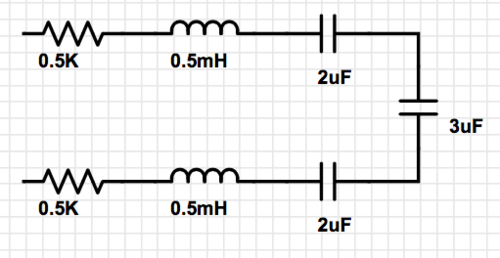| Line 28: | Line 28: | ||
Do not forget that inductors act like resistors in series and parallel; on the other hand, capacitors act in the opposite manner. Capacitors in parallel act like resistors in series and capacitors in series act like resistors in parallel. | Do not forget that inductors act like resistors in series and parallel; on the other hand, capacitors act in the opposite manner. Capacitors in parallel act like resistors in series and capacitors in series act like resistors in parallel. | ||
| − | [[File: | + | [[File:ECE201_5_1.png|500px|center]] |
Finally, combine the last three capacitors in parallel. | Finally, combine the last three capacitors in parallel. | ||
| − | [[File: | + | [[File:ECE201_5_3.png|500px|center]] |
---- | ---- | ||
Latest revision as of 18:07, 26 April 2015
Simplifying a Circuit
Practice question for ECE201: "Linear circuit analysis I"
By: Chinar Dhamija
Topic: Circuit Simplification
Question
Simplify the circuit below and find the resistor, capacitor, and inductor equivalences.
Answer
The first step would be to simplify the circuit by turning it into a series combination. Do not forget that inductors act like resistors in series and parallel; on the other hand, capacitors act in the opposite manner. Capacitors in parallel act like resistors in series and capacitors in series act like resistors in parallel.
Finally, combine the last three capacitors in parallel.
Questions and comments
If you have any questions, comments, etc. please post them below
- Comment 1
- Answer to Comment 1
- Comment 2
- Answer to Comment 2




